17*2.5 Should Baby Eat More if Sleeping Through Night
These age-by-age sleep guidelines from baby's first weeks through baby's first birthday answer parents' top sleep questions, from "when do babies sleep 12 hours" to "how much sleep should a newborn get?"
Week one
"How much sleep does my newborn need?" is an age-old question for new moms and dads everywhere. The short answer? A LOT. If you're worried your baby is sleeping too much or not sleeping enough , we've created a week-by-week guide to help you find the answers you need and develop a newborn sleep schedule that works for your baby and your family. The first step to a healthy sleep pattern is a regular sleep schedule—we've got you covered, mama.
To help you figure out the early weeks of newborn sleep, we've put together a handy sleep schedule of how much your one-week-old is sleeping, plus some tips for ensuring the best sleep.
How much sleep does a one-week-old baby need ?
Your new baby needs lots of sleep: a newborn should get 14-17 hours of sleep per 24 hours , according to the National Sleep Foundation.
"Newborns need about 14-17 hours of sleep in a 24 hour period," says Rachel Mitchell , a certified pediatric and maternity sleep consultant. "Because sleep is still inconsistent in this stage, naps will vary in length and stretches of night sleep will also vary. Ideally, newborns are getting between 4.5-6.5 hours of day-sleep and 10-12 hours of night-sleep, but your baby is going to have a hard time telling the difference between their days and nights which can make sleep feel like it all blends together. To help with this, I recommend waking your baby at the three-hour mark for naps and exposing them to light as much as possible during awake periods, and keeping the room dark for both naps and night sleep. If it seems like your baby struggles to sleep in the crib or bassinet, it is OK to hold [them] for 1-2 naps, but make sure you are still attempting naps in the crib/bassinet for at least 2-3 naps per day. Bedtime will also be later in this stage since your baby is not yet producing the hormone melatonin. Typically newborns do best with a bedtime between 7:30-9:30 pm, so if you notice that your baby struggles with an earlier bedtime don't be afraid to push that back a bit."
A one-week-old baby will likely sleep in spurts because they need to eat often to ensure proper weight gain, and, of course, they need plenty of diaper changes. Your newborn might even fall right back asleep after filling their tummy (if only we all could, right?) However, if your baby is sleeping through feedings, ask your pediatrician for advice.
One-week-old baby sleep schedule
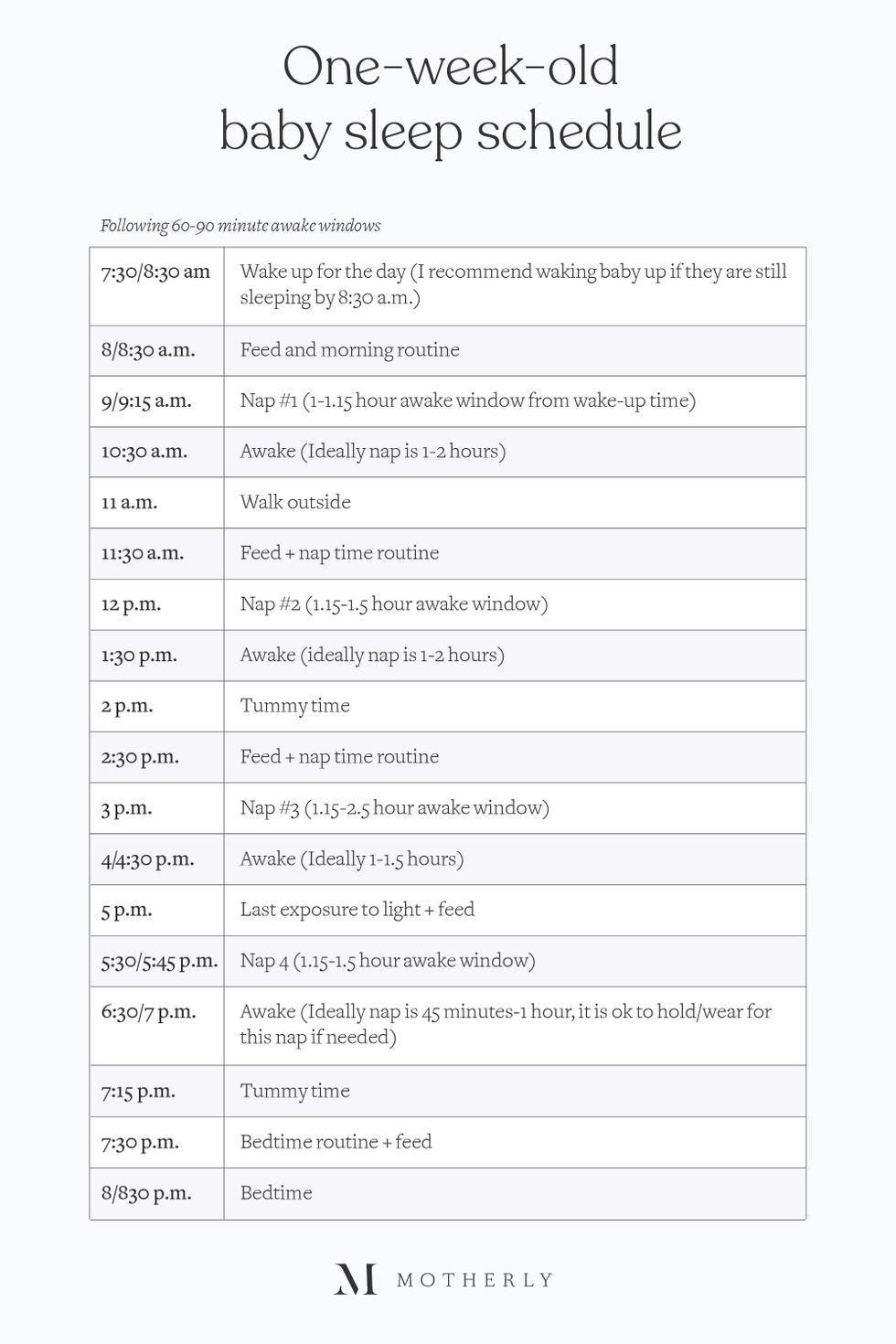
You may be wondering how you will get your baby fed with that much sleeping going on, so we've put together a sample sleep schedule of what one 24-hour period with a one-week-old baby would look like. Newborns make their own schedule, for the most part. Developing a solid sleep schedule can take a few weeks (or longer) to take hold.
You may even notice your baby gets themselves on their own regular routine after two or three weeks, and you can take their lead if it works for your family. Therefore, this is just a rough guide of what you can expect your baby to do, not a strict sleep schedule to adhere to.
Wake windows for a one-week-old baby
What are wake windows and why are they important? A wake window is the period of time a baby can stay awake in between naps without being overtired. Since newborn babies can't self-regulate their own sleep patterns, they can become overtired instead of simply just falling asleep.
"Because sleep still varies you are not following a by-the-clock schedule, but rather awake windows between 60-90 minutes. You can have a schedule in mind but just understand this will change daily. You may find that it is hard for your one-week-old to stay awake, which is completely normal. Remember that they are still adjusting to life outside of the womb and they are growing rapidly, which makes them quite tired!" says Mitchell.
Sleep tips for newborns
Your one week old doesn't yet know the difference between night and day. Keeping things quiet, dim, and calm during those nighttime feedings and diaper changes can help them recognize it's still time to sleep.
Remember, try not to keep your baby awake if they don't want to be. An overly tired newborn can have trouble settling down and falling asleep at all, even if they're exhausted.
- Always place your baby on their back to sleep, not on the stomach or side. This helps to reduce the risk of Sudden Infant Death Syndrome (SIDS) and Sudden Unexplained Infant Death (SUID). The American Academy of Pediatrics initiated the "Back to Sleep" movement in 1992, and rates of SIDS/SUID have decreased dramatically since.
- Do not put anything else in the crib or bassinet. Keep plush toys, pillows, blankets, loose sheets, and bumpers out of your baby's crib or bassinet for similar reasons as above.
- Avoid overheating. Even though they're itty-bitty babies, you can dress them according to the room's temperature. Don't over-swaddle or over-layer their clothing.
- Try a pacifier. "You can also introduce the swaddle and pacifier at this stage to help promote sleep once the feeding relationship has been established," Mitchell says. If they reject it, that's OK. If it falls out, that's OK.
- Use a white noise machine. Whether your house is quiet as a mouse, or you've got other kids running around making noise, a white noise machine can help your baby feel soothed (and possibly tune out) in their surroundings. Mitchell also says it "will help replicate that sound your baby heard frequently in the womb."
- Snuggle it up. Your newborn wants your cuddles as much as you want to give them—especially if they're fussy. Swaddle them up snugly, then rock them until they quiet down. There's no such thing as holding a newborn too much (for safety reasons, don't fall asleep with them in your arms).
For more baby sleep schedules click here.
Week two

Your baby's two weeks old! That first week might have felt like an eternity (mostly because you were awake for way more hours way more hours in the day than you're used to) and you may feel like you'll never get in a rhythm, but as your little one continues to adjust to the world outside the womb, you'll continue to adjust to motherhood . If it seems like your bundle of joy is sleeping at all hours of the day, don't worry, that's normal! This week, though, they'll start being able to tell the difference between day and night, which is bound to make both of your lives easier.
We've put together a handy schedule that shows how much the typical newborn sleeps, as well as some tips on these early days of sleeping, to help you navigate these early weeks of newborn sleep. We know it seems overwhelming right now, but you've got this, mama!
How much sleep does a two-week-old baby need ?
You may not be getting much sleep these days, but your new baby needs lots of it: a newborn should get 14-17 hours of sleep per 24 hours , according to the National Sleep Foundation.
"At two weeks old, your baby's sleep is very similar to week one, not changing much," says Rachel Mitchell, a certified pediatric and maternity sleep consultant . "The only difference you may see is that your baby is starting to become slightly more alert than they were at week one. If you haven't implemented a nap and nightly routine, I also suggest starting this now, as it will help all of you start to find a regular rhythm and help your baby become more prepared for sleep. Your nap routine should be about 15-25 minutes including a feed and your bedtime routine closer to 20-30 minutes."
Mitchell also adds that in this stage, "it is completely fine to feed or rock your baby to sleep. A lot of parents worry that this will create bad 'habits,' but in this stage, your baby is not yet making those associations. You just want to make sure you aren't feeding to sleep for every nap, at night, and for every wake-up. If you are starting to venture outside of the home, know that it is OK if your baby falls asleep in the car or the stroller, but you want to make sure that you are practicing safe sleep in these spaces, and that you can always see your baby. Remember that the safest and best sleep for your baby is always in their own environment in a crib or bassinet so while you don't need to be home-bound, just do your best to plan outings around naps."
Two-week-old baby sleep schedule
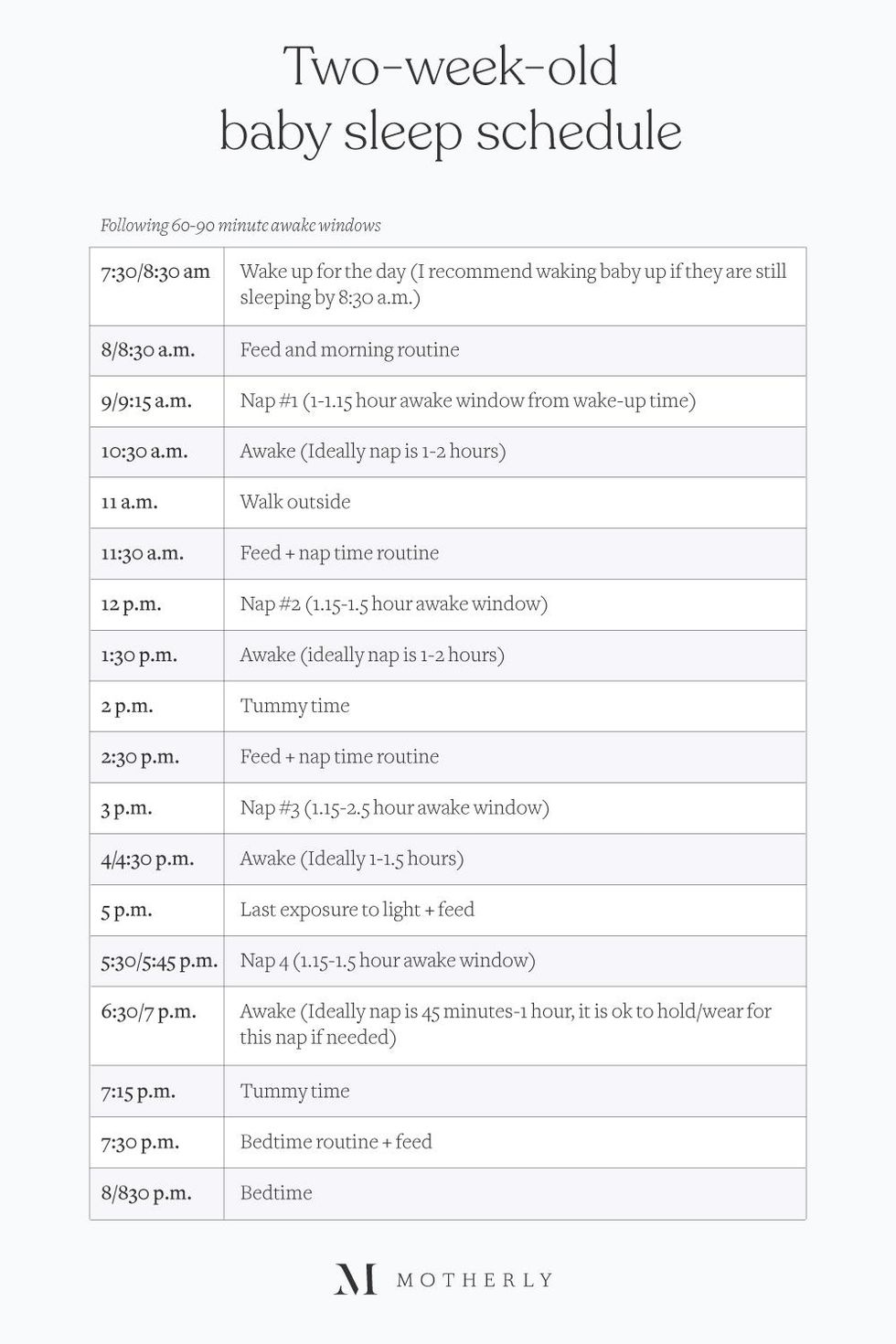
With all that sleep happening, you may be worrying about when you'll have time to feed, change and engage with your little sweetie. That's where we come in. We've put together a sample sleep schedule of what one 24-hour period with a two-week-old baby would look like.
(Note: this is meant to be a rough guide of what you can expect a day to look like, but it is not meant to be a sleep schedule you put your baby on.)
Wake windows for a two-week-old
The phrase "wake window" may be foreign to you now, but it's something you'll be conscious of for the next year-plus. A wake window is the period of time an infant can stay awake in between naps without getting overtired. Newborns are unable to self-regulate their sleep patterns, so instead of simply just falling asleep, they can become overtired .
Mitchell notes that for a two-week-old baby the wake window is 60-90 minutes, which is the longest they will be able to stay awake.
For more baby sleep schedules click here.
Week three
It's been three weeks since your bundle of joy has been in your life, and though some semblance of routine may be starting to emerge (feed, sleep, poop, repeat), it's natural to wonder if your baby will ever get onto a sleep schedule. The good news is, your little one is beginning to distinguish day from night at this age. Bad news is, they're still going to need to eat every few hours, even at night. We know you're exhausted and wonder if you (or your child) will ever sleep through the night. You will! But not quite yet.
The newborn days are hard and we're here to help. We've put together a handy schedule showing how much the average three three-week-old sleeps, plus some tips on these early days of sleeping .
How much sleep does a three-week-old baby need ?
Your baby is still sleeping a lot: a newborn at this age should get 14-17 hours of sleep per 24 hours , according to the National Sleep Foundation.
"At three weeks old, there is no major change in your baby's sleep from previous weeks," says founder of My Sweet Sleeper Rachel Mitchell, a certified pediatric and maternity sleep consultant. "However, your baby is likely starting to take in more during feeds, which can help promote longer stretches of sleep at night."
It's during this time that feeding habits may change. "You may also ask your pediatrician around this time if you can stop waking up your baby at night to feed and wait until they wake you," says Mitchell. "Once you get the green light to do this, if you notice your baby is still waking every couple hours at night, ensure they are getting full feeds every three hours during the day and consider offering a dream feed between 10 and 11 p.m."
However, baby still needs you. "Remember in this stage that your baby needs you to help them self-regulate. Your baby is not yet ready to learn independent soothing skills and so it is important that you respond to your baby quickly when they start crying. Stirring or fussing is normal and doesn't necessarily need an immediate response, but hard crying should be capped at just a few minutes. While you can't work on independent soothing yet, you can focus on the four key areas of foundations which are nutrition, sleep environment, routine, and awake windows."
Three-week-old baby sleep schedule

With all those zzz's you may wonder how you'll have time for anything else. We've put together a sample schedule so you can visualize what one 24-hour period with a three-week-old baby may look like. (Note: this is meant to be a rough guide of what you can expect; it's not meant to be a sleep schedule to attempt to put your baby on.)
Wake windows for a three-week-old
A wake window is the period of time a baby can stay awake in between snoozes without getting overtired. Newborn babies can't self-regulate their own sleep patterns and can become overtired instead of simply just falling asleep, so wake windows are crucial in making sure your little one is as happy as can be. At this age, 60-90 minutes are the longest a newborn baby will be able to stay awake, according to Mitchell.
For more baby sleep schedules and baby sleep tips click here.
Week four
Can you believe your baby is four weeks old?! In the past month, there were surely some ups and downs (and tears from both of you) as you and your little one continue to adjust to your new lives. Your newborn now knows the difference between day and night, but that doesn't mean they're sleeping through the latter. (That will come later, we promise!) Now that you feel like you might have some sort of semblance of routine, you may be wondering how much sleep newborns need and if yours is getting enough (or too much!). That's where we come in.
To help you navigate these early weeks of infant sleep, we've put together a guide that includes a handy sleep schedule that illustrates how much the average four-week-old baby sleeps , plus some tips on these early days of sleeping.
How much sleep does a four-week-old baby need?
Think your baby sleeps a lot? That's a good thing! According to the American Academy of Sleep Medicine, a newborn should get 12-16 hours of sleep per 24 hours .
"At four weeks old, your baby is officially one month, which is an exciting milestone! By this time you have started to get into a routine throughout the day and before naps and bedtime. If you haven't implemented a routine, you want to make sure you start one as soon as possible," says Rachel Mitchell, founder of My Sweet Sleeper . "At this stage, you've likely noticed that your baby is much more alert than they were at week 1, and thus their naps may start to feel a little more consistent, although they will still change from day-to-day. It is recommended for your baby to be taking between 4-5 naps per day which will continue to vary in length. You can continue to hold for one or two naps of the day if needed and attempt at least 2 naps in the crib/bassinet. If you do need to hold for a nap try to do this for the 2nd and 4th nap of the day as these are usually the most difficult for your baby."
This amount of sleep might have been welcomed during the first few weeks, but now you may be wondering how you'll get anything done with your baby when they're sleeping most of the day. We've put together a sample sleep schedule so you can see what one 24-hour period typically looks like with a four-week-old. (Note: this is meant to be a rough guide, not a sleep schedule to attempt to put your baby on.)"If you are wondering if you can follow a schedule yet, it is not quite time! In fact, you have quite a while until you can follow a by-the-clock schedule with your baby. However, you can definitely have a schedule in mind that you are working off of, just remember it will still change from day to day so don't worry if it still feels very inconsistent-that is normal and expected!" says Mitchell.
Sleep schedule for a four-week-old baby

Wake windows for a four-week-old baby
If you're unfamiliar with the term "wake window," don't worry — with time it'll become a constant phrase in your vocabulary. A wake window is the period of time an infant can stay awake in between naps without getting overtired. Since newborn babies are unable to self-regulate their sleep patterns, it's easier for them to become overtired instead of simply just falling asleep.
Each baby is different; however, most newborns can't stay awake longer than 45 minutes, and the average wake window for a four-week-old baby is 30 minutes. During this time, you can change their diaper, feed them, bathe them, do some tummy time, read, sing, or engage in whatever way you'd like before it's time for them to catch some zzz's again.
Sleep tips for newborns:
Newborns make their own schedule for the most part. Developing a solid sleep schedule can take a few weeks (or longer) to take hold. You may even notice your baby gets themselves on their own regular routine after two or three weeks, and you can take their lead if it works for your family.
Your four-week-old doesn't yet know the difference between night and day. Keeping things quiet, dim, and calm during those nighttime feedings and diaper changes can help them recognize it's still time to sleep.
Remember, try not to keep your baby awake if they don't want to be. An overly tired newborn can have trouble settling down and falling asleep at all, even if they're exhausted.
- Always place your baby on their back to sleep, not on the stomach or side. This helps to reduce the risk of Sudden Infant Death Syndrome (SIDS) and Sudden Unexplained Infant Death (SUID). The American Academy of Pediatrics initiated the "Back to Sleep" movement in 1992, and rates of SIDS/SUID have decreased dramatically since.
- Do not put anything else in the crib or bassinet. Keep plush toys, pillows, blankets, loose sheets, and bumpers out of your baby's crib or bassinet for similar reasons as above.
- Avoid overheating. Even though they're itty-bitty babies, you can dress them according to the room's temperature. Don't over-swaddle or over-layer their clothing.
- Try a pacifier. If they reject it, that's OK. If it falls out, that's OK. If you're breastfeeding, you may want to wait until baby is comfortable with latching and effectively nursing before introducing a pacifier.
- Use a white noise machine. Whether your house is quiet as a mouse, or you've got other kids running around making noise, a white noise machine can help your baby feel soothed (and possibly tune out) in their surroundings.
- Snuggle it up. Your newborn wants your cuddles as much as you want to give them—especially if they're fussy. Swaddle them up snugly, then rock them until they quiet down. There's no such thing as holding a newborn too much (for safety reasons, don't fall asleep with them in your arms).
For more baby sleep schedules and baby sleep tips click here.
Week five
"How much sleep does my five-week-old baby need?" is an age-old question for new moms and dads everywhere. The short answer? A LOT. If you're worried your baby is sleeping too much or not sleeping enough , we've created a week-by-week guide to help you find the answers you need and develop a newborn sleep schedule that works for your baby and your family. The first step to a healthy sleep pattern is a regular sleep schedule—we've got you covered, mama.
To help with the early weeks of newborn sleep, we've put together a handy sleep schedule of how much your five-week-old is sleeping .
How much sleep does a five-week-old baby need?
At five weeks old, your baby is still considered to be a newborn for a few more weeks but is likely growing bigger and stronger every day. And your baby is growing so well because you, mama, are doing everything right.
Your baby won't be sleeping through the night just yet, but they're likely having longer wake times and sleep stretches—hooray! Much like those first few weeks, your baby still needs to sleep for an average of 16 hours in a 24-hour-period . Remember, all babies are different and they all develop at their own pace—that includes sleeping, too!
" At five weeks old, your baby has likely given you at least one stretch of sleep at night over 4 hours, which can feel life-changing! Continue to focus on full feeds throughout the day to ensure that your baby is able to sleep longer stretches at night without a feed. It is still normal though for your baby to need anywhere from 1-3 feeds overnight in this stage," says Rachel Mitchell, founder of My Sweet Sleeper. "Remember that inconsistent naps are still developmentally normal, but keep attempting naps every 60-90 minutes and make sure to watch your baby's sleep cues closely to see if they may need to go to sleep sooner. All babies vary in their awake windows which is why we provide a range, so you may see your baby is on the shorter end or higher end of the range."
When it comes to developing a solid daily routine, your five-week-old likely already has one. Babies are great at adapting to predictability and often end up sleeping, waking, and eating at similar times each day. If you're looking to establish a more set routine for your five-week-old, here's a sample sleep schedule of what one 24-hour period with a five-week-old baby would look like.
(Note: this is meant to be a rough guide of what you can expect your baby to do; however, this is not meant to be a strict sleep schedule to adhere to.)
5-week-old baby sleep schedule

What are wake windows and why are they important?
A wake window is the period of time a baby can stay awake in between naps without being overtired. Since newborn babies can't self-regulate their own sleep patterns, they can become overtired instead of simply just falling asleep.Wake windows for a five-week-old
For a five-week-old, the average wake window is still 30-45 minutes. During these wake windows, you can change their diaper, sing to them, talk to them, snuggle, set them down safely in a swing, or do whatever you want to do with them before it's time for them to catch some zzz's again.
Sleep tips for newborns
Newborns make their own schedule for the most part. Developing a solid sleep schedule can take a few weeks (or longer) to take hold. You may even notice your baby gets themselves on their own regular routine after two or three weeks, and you can take their lead if it works for your family.
Your five-week-old may still not know the difference between night and day. Keeping things quiet, dim, and calm during those nighttime feedings and diaper changes can help them recognize it's still time to sleep.
Remember, try not to keep your baby awake if they don't want to be. An overly tired newborn can have trouble settling down and falling asleep at all, even if they're exhausted.
For more baby sleep schedules and baby sleep tips click here.
Week six
You've made it to week six, and if your baby's an early learner they might have gifted you with that first precious social smile . If not, don't worry! Most infants hit this milestone between six to eight weeks. As you continue to get into a groove with your baby, you may be wondering if there's supposed to be some sort of pattern with sleep at this age (because it seems like they're snoozing constantly , yet you somehow never sleep).
To help you navigate these early weeks of newborn sleep, we've put together a handy sleep schedule of how much your six-week-old is sleeping , plus some tips on these early days of sleeping. We know it seems overwhelming right now, but you've got this, mama!
How much sleep does a six-week-old baby need?
You may be sleep-deprived these days, but your new baby needs lots of zzz's. According to the American Academy of Sleep Medicine, a newborn should get 12-16 hours of sleep per 24 hours .
"At six weeks old your baby is likely going through their first major development leap and you may start to see longer stretches of sleep at night (between 4-6 hours) more consistently," says Rachel Mitchell, founder of My Sweet Sleeper. "Your baby will also start to become more alert and aware of their surroundings during the day, which means those 3-hour naps may start to become less frequent."
With so much time dedicated to sleep, you may be wondering when you'll have time to feed, change, bath and engage with your little one. That's where we come in. We've put together a sample sleep schedule of what one 24-hour period with a six-week-old baby would look like. (Note: this is meant to be a rough guide of what you can expect a day to look like, but it is not meant to be a sleep schedule you put your baby on.)
Six-week-old baby sleep schedule
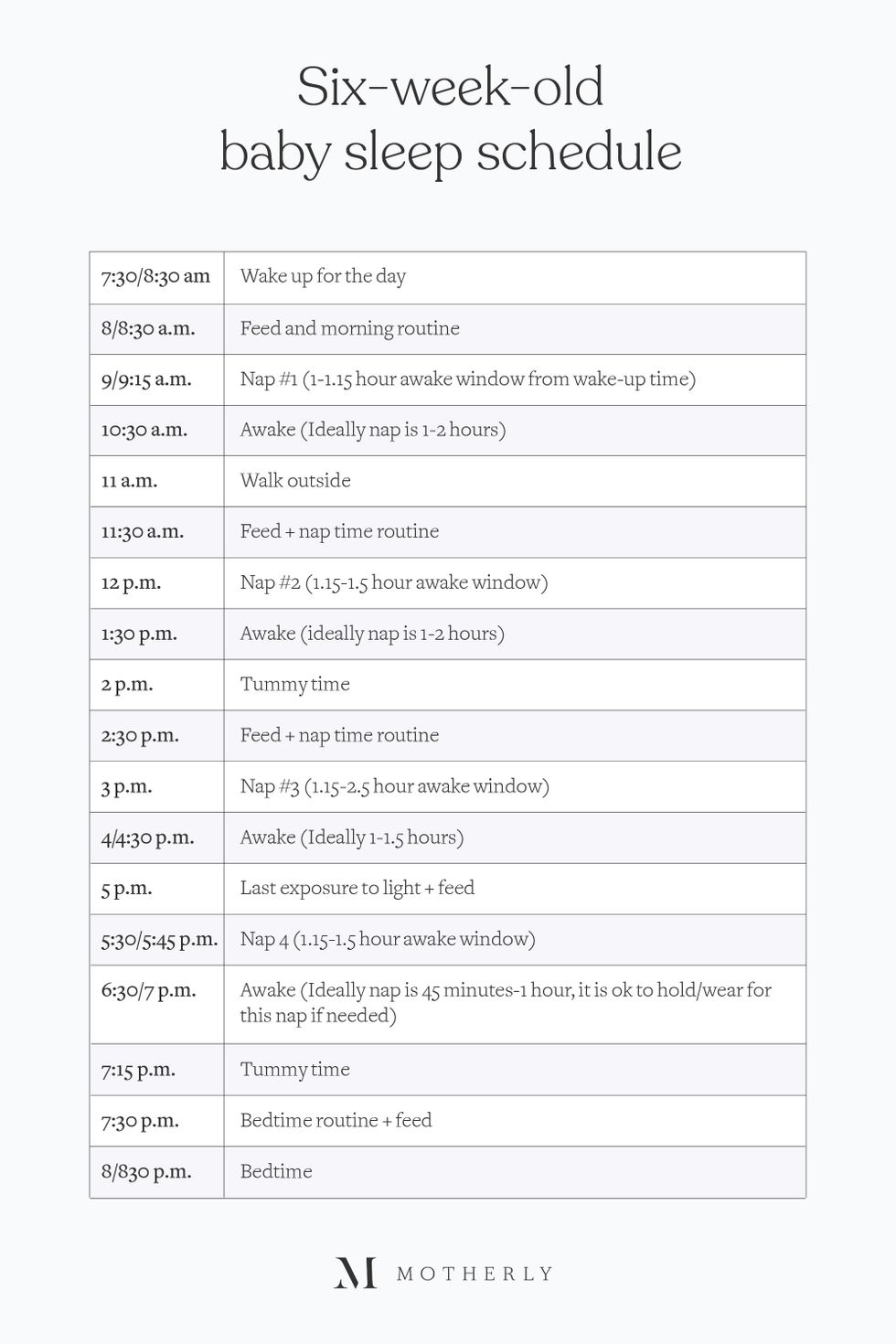
"This is also the time that your baby's peak fussy period can start which can cause them to become really fussy in the evening and you may see they start to fight the last nap of the day. If this is happening, it is completely OK to hold or babywear for that last nap," says Mitchell. "Continue to practice a later bedtime (between 7:30-9:30 pm) and make sure that you are consistent with your nightly routine. Offering a luke-warm bath, dimming the lights, and turning on white noise in the evening can also help with your baby's fussy periods as well as nursing or feeding if needed. Remember that nursing to sleep in this stage is still completely normal and encouraged on occasion, especially if it helps settle your baby during this fussy period."
Wake windows for a six-week-old
If you're not yet familiar with the term "wake window," it's the period of time a baby can stay awake in between naps without getting overtired. Newborns are unable to self-regulate their sleep patterns, so instead of simply just falling asleep, they can become overtired . And that's not good for anyone!
Though each baby is different, most newborns can't stay awake longer than 45 minutes (the average wake window for a six-week-old baby is 30 minutes). This is the time where you'll be able to change their diaper, feed them, bathe them, and/or stimulate them with songs, books, tummy time, or whatever you'd like before it's time to snooze again.
Sleep tips for newborns:
As you work on creating a daytime and evening sleep schedule for your baby, establish a bedtime routine and hopefully get a bit more sleep yourself.
For more baby sleep schedules and baby sleep tips click here.
Week seven
Your baby's seven weeks old! If they're an early learner, they may be able to lift their head and give you a heart-melting gummy social smile, but if not don't worry! Those milestones will come in the following weeks. As you and your little one continue to get adjusted to your new lives together, you may be wondering what newborn sleep schedules are supposed to look like (and when you'll ever get to sleep again).
We've put together a handy schedule that shows how much the typical newborn sleeps, as well as some tips on these early days of sleeping, to help you navigate these early, sleep-deprived weeks.
How much sleep does a seven-week-old baby need?
Your newborn needs sleep, and lots of it: according to the American Academy of Sleep Medicine, a newborn should get 12-16 hours of sleep per 24 hours .
"At 7 weeks old, you may notice that your baby's naps are starting to become a bit shorter, which is normal. Because newborn sleep cycles only last between 30-40 minutes or so, it is common to see a lot of naps that only last this long. In this case, it is fine to help your baby go back to sleep by replacing their pacifier or picking them up and rocking them back to sleep," says Rachel Mitchell, founder of My Sweet Sleeper . "If you notice that your baby is only taking short naps, you can practice a held nap for at least one nap per day, if that helps your baby connect sleep cycles. You just want to make sure to do this safely and to still attempt crib naps for the majority of naps throughout the day."
With most hours of the day dedicated to snoozing, you may be wondering about when you'll have time to feed, change, bath and engage with your little sweetie. We've put together a sample sleep schedule of what one 24-hour period with a seven-week-old baby could look like. (Note: this is meant to be a rough guide of what you can expect a day with your baby to look like; however, it is not meant to be a sleep schedule you put your baby on.)
Seven-week-old baby sleep schedule

"Peak fussiness will likely continue through this stage, tapering off in a few weeks so continue to practice a later bedtime, unless it seems that your baby does better with an earlier one. This sometimes takes a bit of trial and error to find their sweet spot for bedtime!" says Mitchell.
Wake windows for a seven-week-old
What is a wake window and why is it important? A wake window is the period of time an infant can stay awake in between naps without getting overtired. Newborns are unable to self-regulate their sleep patterns, so instead of simply just falling asleep, they can easily become overtired . And that's bad news for everyone!
Though each baby is different, most newborns can't stay awake longer than 45 minutes. The average wake window for a seven-week-old baby is 30 minutes. During this time you can change their diaper, feed them, bathe them, stimulate them with some tummy time, books, or songs, or engage in any other activity you'd like before it's time to catch some zzz's again.
For more baby sleep schedules and baby sleep tips click here.
Week eight

For new parents, sleep is a precious and rare commodity . By eight weeks, most parents are going on two full months of no sleep. The highs of new parenthood have potentially worn off while the feelings of sheer exhaustion take over. It was around the eight-week mark I remember questioning if I would ever sleep through the night again.
You won't be sleep deprived forever and there are ways to get through those early weeks of sleep. To help you, we've put together a simple sleep schedule of how much your eight weeks old is sleeping, plus some tips on these first few weeks of sleeping.
How much sleep does an eight-week-old baby need?
Newborns need a ton of sleep: according to the American Academy of Sleep Medicine, a newborn should get 12-16 hours of sleep per 24 hours .
"Congratulations, your baby is now officially 2 months old! By this [stage] your baby has likely given you several long stretches of night sleep and naps are becoming more pronounced, although they are still going to vary for a while. Night sleep almost always organizes before day sleep so it is not uncommon for your baby to take consistent stretches at night but then to take two 40 minutes naps, and then a 2.5-hour nap. Typically I recommend waking your baby at the 2.5-3 hour mark though to ensure they aren't missing a feed, and their naps are being distributed properly throughout the day," says Rachel Mitchell, founder of My Sweet Sleeper.
Your newborn will spend at least half, but usually more, of the days catching some zzzs. You're probably wondering when the baby eats if they are sleeping so much. We've put together an example of a sleep schedule for an 8-week-old baby.
Below is what your schedule may look like over the course of a 24-hour day. (Keep in Mind: This is a rough guide of what you can expect from your baby. It's not meant to be a sleep schedule you put in place for your baby.)
Eight-week-old baby sleep schedule
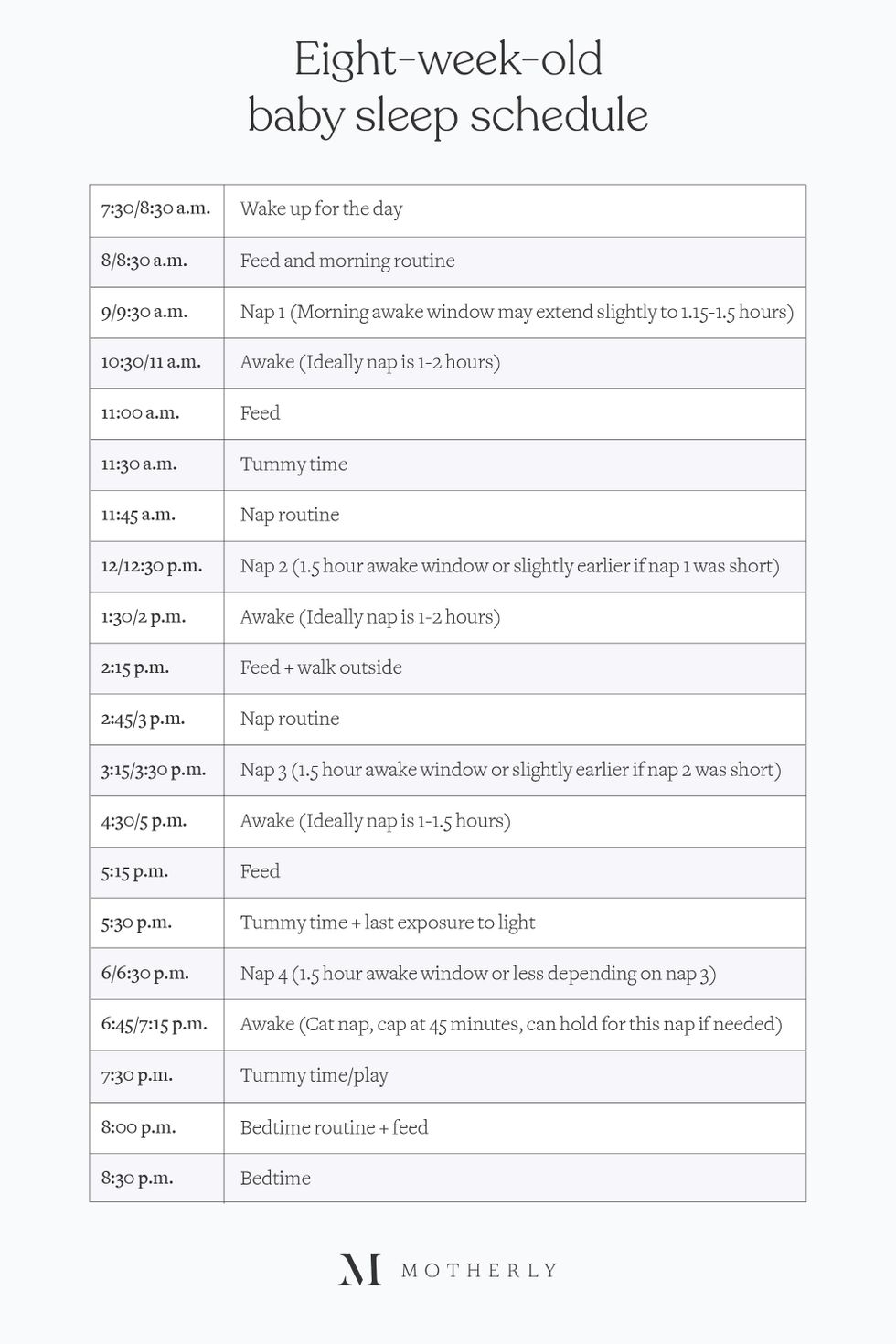
"This is also around the time that your baby is seeming a lot more alert and possibly even getting distracted by their surroundings. Because of this, I recommend feeding in a low stimulating environment and making sure to give your baby plenty of transition time from activities to sleep periods so they have time to wind down. You are still following 60-90 minute awake windows at this point but you may notice that your baby can stay awake a little longer than they could just a few weeks ago. Continue to watch sleepy cues to help determine the optimal time for your baby to sleep," says Mitchell.
Wake windows for an eight-week-old
Newborn babies can't self-regulate their sleep patterns. By eight weeks, mom or dad will probably start picking up on cues that indicate the baby is tired. And it's imperative we pay attention to those cues because an overtired baby tends to have a hard time falling asleep and staying asleep.
Babies tend to have wake windows; a period of time a baby can stay awake in between naps without being overtired. Every baby is different, but on average, newborns can't stay awake for longer than 45 minutes. The average wake window for an 8-week-old newborn is between 45 and 90 minutes at a time. During this time, you can change their diaper, talk to them, rock them or do whatever you want to do with them before it's time to sleep again.
For more baby sleep schedules and baby sleep tips click here.
Week nine
"Are you getting any sleep yet?" That's one of the most common questions a new parent gets. And when the baby is nine weeks old, it's a question most parents probably don't want to hear.
It's unlikely your baby will sleep through the night by nine weeks. But that doesn't mean you have to have completely sleepless nights . There are many ways to navigate these early weeks of newborn sleep. And we've put together a simple sleep schedule including how much time your nine-week-old is sleeping and tips on those early days.
To help you navigate these early weeks of newborn sleep, we've put together a handy sleep schedule of how much your nine-week-old is sleeping, plus some tips on these early days of sleeping.
How much sleep does a nine-week-old baby need?
Your new baby needs lots of sleep: a newborn should get 14-17 hours of sleep per 24 hours , according to the National Sleep Foundation.
"At nine weeks, you should see a pattern start to emerge with 3-4 naps per day, and at least two of those naps are ideally longer than 1-1.5 hours. If short naps persist and you notice that your baby isn't taking ANY long naps, you want to make sure that all of your baby's sleep foundations are in place. You can do this by focusing on full feeds every three hours throughout the day (with 1-2 feeds at night), a consistent nap and bedtime routine, practicing a consistent sleep environment that is promoting of sleep, and following 60-90 minute awake windows," says Rachel Mitchell, founder of My Sweet Sleeper . If short naps continue to persist, keep practicing one assisted nap of the day."
There's a reason people say all newborns do is eat, sleep and poop. While every baby is different, the majority of newborns sleep on and off most of the day. And when they aren't sleeping, they are eating.
To get yourself in a routine, we've put together a 24-hour mock sleep schedule for your 9-week old baby. (Note: this is meant to be an example of what you can expect your baby to do, however this is not meant to be a sleep schedule to attempt to put your baby on.)
Nine-week-old baby sleep schedule
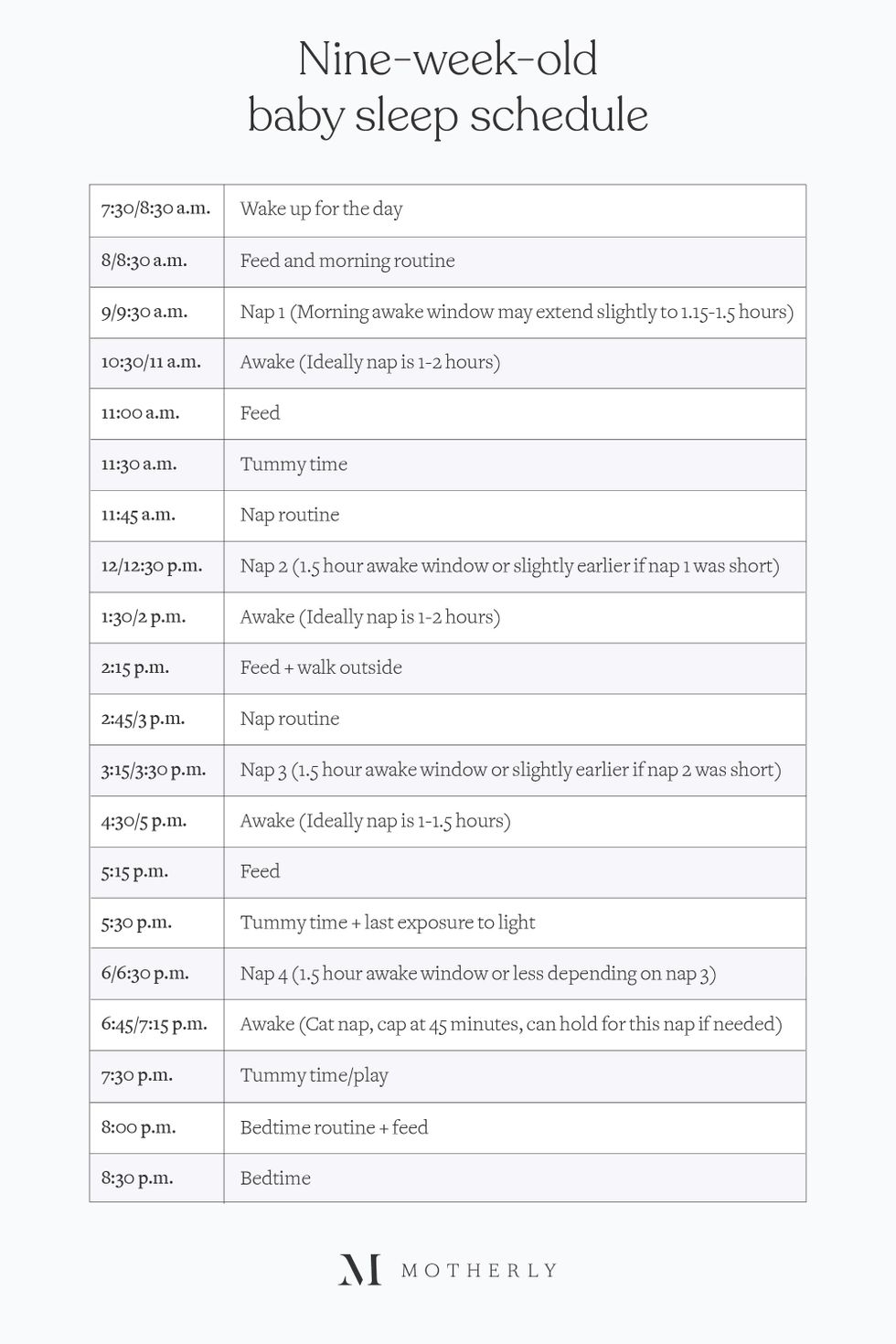
"You will also notice that the less day sleep your baby gets, the more likely they are to wake up throughout the night. This is because sleep promotes sleep, so keep working on those naps and be as consistent as you can. You can continue to practice a later bedtime in this stage, unless you notice that your baby does better with an earlier bedtime. This is fine as long as bedtime isn't before 630pm," says Mitchell.
Wake windows for a nine-week-old
While every baby is different, most newborns can't stay awake for more than 45 minutes at a time. These periods of time when the baby is awake in between naps are called wake windows. Wake windows are important because babies can't self-regulate their own sleep patterns. An overtired baby struggles to fall asleep, so it's important the baby doesn't stay up longer than the appropriate wake window.
The average wake window for a nine-week-old newborn is 60-90 minutes at a time. During wake windows, you can do anything you want with the baby, including singing to them, playing with them, talking to them, taking them for a walk, changing their diapers or feeding them. By nine weeks, your wake windows are getting longer, so you can do a little more before it's time for the baby to hit the hay again.
For more baby sleep schedules and baby sleep tips click here.
Week ten
At this point, you are 10 weeks postpartum and probably still waking up in the middle of the night. Don't stress about it. That's expected. But even though you knew you were going to run on months of sleepless nights, the exhaustion is starting to catch up .
But we've got your back with some tips on how to navigate those early weeks of sleep. Plus, a sample sleep schedule to help you get you and the baby on track.
How much sleep does a 10-week-old baby need?
Your newborn will spend most of his or her time sleeping: according to the American Academy of Sleep Medicine, a newborn should get 12-16 hours of sleep per 24 hours .
"At 10 weeks, the amount of naps and overall sleep totals remain the same. But at this stage, it becomes more realistic to start to practice putting your baby down awake instead of completely asleep," says Rachel Mitchell, founder my My Sweet Sleeper. "Remember, though, it is just practice and it will take time for your baby to learn this skill. I continue to recommend the use of the pacifier, white noise, swaddling and ensuring the room is dark for all naps and night sleep."
With all that sleep, you may be wondering when your baby will eat. Basically, when a baby isn't sleeping , he or she is eating. To make your life as easy as possible, we've put together an example of what a 24-hour sleep schedule will look like for a 10-week-old infant. (Note: This is a rough guide of what you can expect from your baby. It's not meant to be a sleep schedule you put in place for your baby.)
10-week-old baby sleep schedule

"You can also start to think about moving bedtime slightly earlier by moving it up about 30 minutes each day and seeing how your baby responds. If they struggle with this, it is OK to hold off for a bit longer, as melatonin isn't quite producing yet so an earlier bedtime might still be tough for your baby," says Mitchell.
Wake windows for a 10-week-old
Babies usually eat during their wake windows. A wake window is the period of time when the baby is awake in between nap times. They are important to know about because an overtired baby struggles to fall asleep.
The average wake window for a 10-week-old infant is 45-60 minutes. This is the sweet spot of how long your baby should be awake so they aren't too tired. During the baby's wake window, you can feed the baby, change the diaper, play with the baby or do anything you want. But don't try to keep the baby up longer than their wake window, otherwise, you could end up with a fussy baby who isn't getting enough sleep.
For more baby sleep schedules and baby sleep tips click here.
Week 11
A newborn's sleep schedule can sometimes be difficult to decipher: How much sleep does your baby actually need? And are they getting enough sleep? If you're wondering about how much sleep your 11-week-old baby should be getting each day, we've got some answers for you. Because sleep is so vitally important for your baby (and you, too, for that matter !), we've created a helpful week-by-week guide to assist you in navigating the early months of your baby's sleep journey. You've got this, mama.
To help you navigate these early weeks of newborn sleep, we've put together a handy sleep schedule of how much your 11-week-old is sleeping, plus some tips on these early days of sleeping.
How much sleep does an 11-week-old baby need?
According to The Baby Sleep Site , at 11 weeks old your baby will be sleeping about 14-16 hours total each day—about 10 hours at night, and 4-6 hours total during the day. By eleven weeks, your baby will even be ready for a more predictable bedtime and bedtime routine , too. While this can be flexible, an 11-week-old's bedtime should fall somewhere between 7 and 10 pm. The first step in creating a difference between baby's nighttime sleep and daytime sleep is having an official bedtime, which will aid in baby's development.
In creating a bedtime routine , keep it short (babies can become overtired otherwise). Consider relaxing activities, like singing a lullaby and reading a simple bedtime story. While some babies do find an evening bath soothing, others tend to get excited during baths, which is the opposite effect you are going for at bedtime.
"Your baby has almost graduated from the newborn stage and, hopefully at this point, you are starting to see a bit more consistency in their sleep patterns. If you still feel like your baby's sleep is chaotic and unpredictable, don't panic! It is still developmentally normal for sleep to be disorganized," says Rachel Mitchell, founder of My Sweet Sleeper . "You may also notice that your baby doesn't need to be fed as frequently overnight. The average amount of night feedings in this stage is between 1-2 as long as your baby is getting adequate nutrition throughout the day. Typically, I recommend trying to book feeds at each end of the night. For example, feeding about 4 hours after your baby has gone to sleep (between 10-1130pm) and then again sometime between 4-530am. All babies are going to vary when it comes to feeds in this stage and you want to ensure that your baby is continuing to gain weight and speak with your pediatrician before you decide to drop a night feed."
To assist in determining baby's schedule, while keeping in mind bedtime and the evolving differentiation between nighttime sleep and daytime sleep, The Baby Sleep Site offers a sample sleep schedule of what one 24-hour period with an 11-week-old baby would look like. (Note: this is meant to be a rough guide of what you can expect your baby to do; however, this is not meant to be a strict sleep schedule to adhere to.)
11-week-old baby sleep schedule
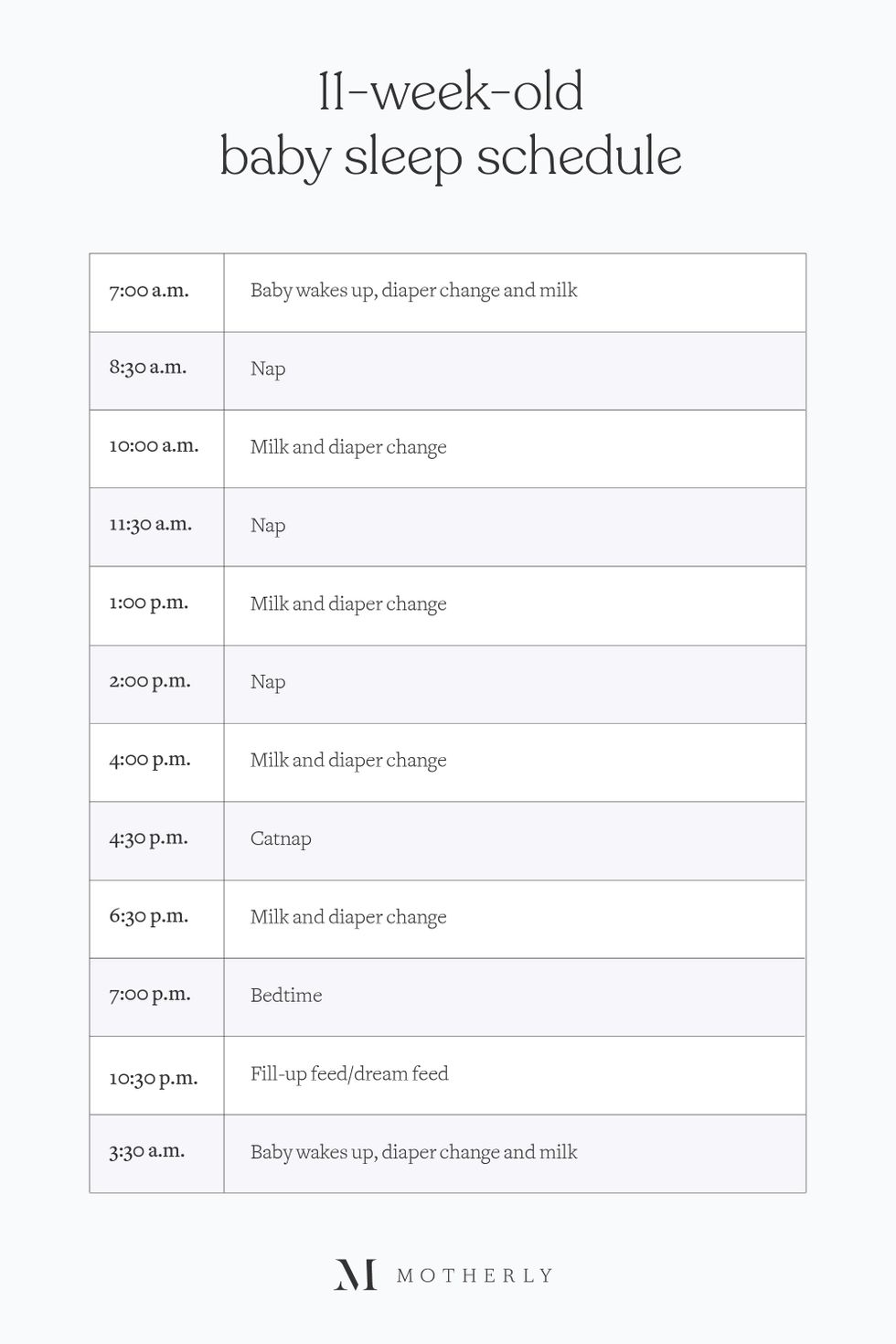
Wake windows for an 11-week-old
A wake window is the period of time a baby can stay awake in between naps without becoming overtired (because newborn babies are unable to self-regulate their own sleep patterns, they can become overtired instead of simply just falling asleep).
The average wake window for an eleven-week-old newborn is 1 to 1.5 hours, according to Amy Motroni, a baby and toddler sleep consultant. While baby is awake, it's time to for eating, playing and getting a diaper change. As your baby approaches 3 months old, they will likely be staying awake a bit more during the day, while some naps may be getting shorter.
For more baby sleep schedules and baby sleep tips click here.
Week 12
As your baby approaches the 12-week mark, you may be wondering if there is any hope for more sleep in your future. We have good news: there totally is!
Twelve weeks marks an important milestone in your baby's development when they start moving towards a more regular sleep-and-wake pattern. Translation? More sleep is on the horizon, mama, we promise. Of course, like all things with parenting, every baby is different and you may need a little help navigating sleep with your growing baby.
By week 12, your baby might be giving you some longer stretches of sleep (yay!). Read on for advice on what a sleep schedule for a 12-week-old should look like, along with tips for catching more zzz's.
How much sleep does a 12-week-old baby need?
Your baby still needs a lot of sleep: according to the American Academy of Sleep Medicine, a newborn should get 12-16 hours of sleep per 24 hours .
"Your baby is no longer considered a newborn in this stage, and they don't need quite as much sleep as they did prior. My recommendation for total sleep is between 3.5-5.5 hours of day sleep and between 10-12 hours of night sleep," says Rachel Mitchell, founder of My Sweet Sleeper . "Ideally, your baby is taking 3-4 naps with 1-2 long naps and sleeping between 10-12 hours at night. This doesn't necessarily mean they will sleep 10-12 hours straight, but the goal is for 10-12 hours overall throughout the night. Awake windows will also lengthen slightly in this stage from 60-90 minutes to 60-120 minutes. I recommend continuing to follow 60-90 minute awake windows in between naps and no more than 2 hours before bed, if your baby can handle it."
Twelve weeks marks a big shift in your baby's sleep, as they start to develop more of a normal wake and sleep pattern instead of the party-all-night attitude they may have shown so far. As those patterns begin to emerge, you may notice more regular wake windows during the day–and more clear signs that your baby is sleepy.
You'll want to pay attention to your baby's sleep cues and help them learn how to sleep (yes, learning to sleep is a skill that can be taught!) by practicing a regular sleep schedule. Every baby and family is different, but here's an example of a sleep schedule that may be helpful for a twelve-week-old.
12-week-old baby sleep schedule
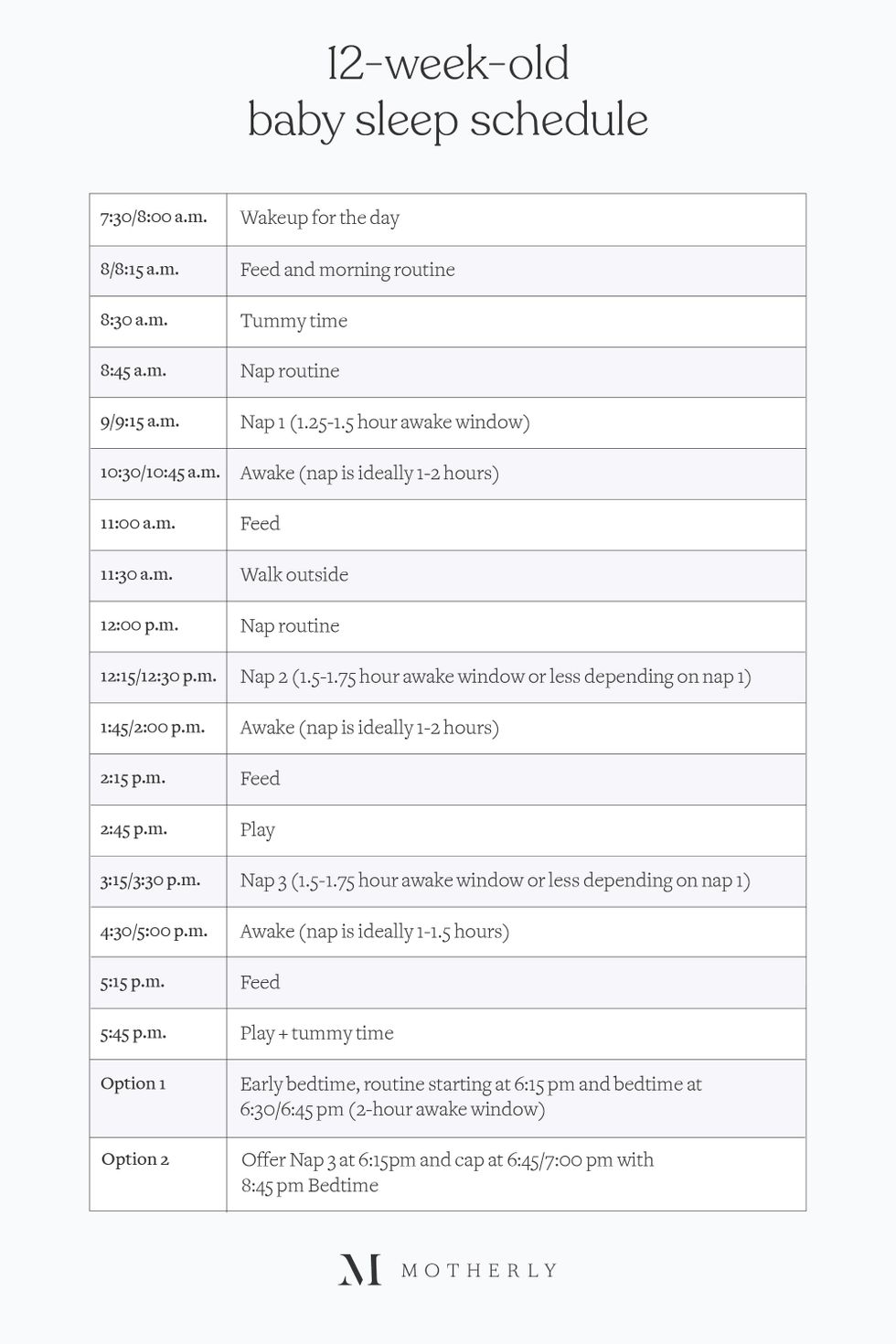
"At this stage, a lot of parents start to see consistent stretches of night sleep, so if you are still seeing that your baby is waking frequently throughout the night, take a look at their foundations and see if there is something that may be preventing them from sleeping well at night such as going to bed overtired or lack of daytime nutrition," says Mitchell.
Wake windows for a 12-week-old
Wake windows are the amount of time your baby can stay awake during the day before she needs a nap. At twelve weeks old, that length of awake time should start to stretch out more. The National Sleep Foundation recommends 14-17 hours of sleep per day for babies 0-3 months old, but that number drops to 12-15 hours around twelve weeks. That means your baby's wake window will gradually start to increase to a couple of hours between naps.
Sleep tips for newborns:
Week 12 marks an exciting–and important–development in babies, as the first signs of a natural circadian rhythm begin to emerge. Some babies may even start to sleep through the night at this age, which, so you're one of the lucky ones to experience this, enjoy it! Of course, that doesn't mean that all babies will be sleeping soundly through the night by this age, but it does mean you might notice longer stretches of sleep in your little one.
You can support the development of your baby's circadian rhythm at this age by establishing a clear bedtime routine, like a bath followed by a special story, to signal to your baby that it's time for sleep. Here are some more tips for encouraging your baby to sleep at twelve weeks old:
- Always place your baby on their back to sleep, not on the stomach or side. This helps to reduce the risk of Sudden Infant Death Syndrome (SIDS) and Sudden Unexplained Infant Death (SUID). The American Academy of Pediatrics initiated the "Back to Sleep" movement in 1992, and rates of SIDS/SUID have decreased dramatically since.
- Do not put anything else in the crib or bassinet. Keep plush toys, pillows, blankets, loose sheets, and bumpers out of your baby's crib or bassinet for similar reasons as above.
- Avoid overheating. Even though they're itty-bitty babies, you can dress them according to the room's temperature. Don't over-swaddle or over-layer their clothing.
- Try a pacifier. If they reject it, that's OK. If it falls out, that's OK. If you're breastfeeding, you may want to wait until baby is comfortable with latching and effectively nursing before introducing a pacifier.
- Use a white noise machine. Whether your house is quiet as a mouse, or you've got other kids running around making noise, a white noise machine can help your baby feel soothed (and possibly tune out) in their surroundings.
- Snuggle it up. Your newborn wants your cuddles as much as you want to give them—especially if they're fussy. Swaddle them up snugly, then rock them until they quiet down. There's no such thing as holding a newborn too much (for safety reasons, don't fall asleep with them in your arms).
For more baby sleep schedules and baby sleep tips click here.
Week 13
If you have a baby, chances are you spend A LOT of time thinking about their sleep habits. Are they getting enough? How much do they really need? Will they ever sleep through the night , or is that just a parenting mirage?
If you're worried about your baby's sleep routine, we've created a week-by-week guide to help you find the answers you need and develop an infant sleep schedule that works for your baby and your family. The first step to a healthy sleep pattern is a regular sleep schedule—we've got you covered, mama.
To help with the early months of infant sleep, we've put together a handy sleep schedule of how much your 13-week-old is sleeping.
How much sleep does a 13-week-old baby need?
Infants up to three months old should be getting 14-17 hours of sleep within a 24-hour period, according to the National Sleep Foundation . By three months of age, many babies will have settled into a predictable sleep routine. Your baby likely takes two to three naps during the daytime, with longer stretches of nighttime sleep compared to those early newborn weeks.
Remember, all babies are different and they all develop at their own pace—that includes sleeping, too!
"This is the stage I recommend parents start to really think about moving their baby's bedtime up if they were on a later bedtime. You can do this by gradually adjusting their bedtime 20-25 minutes each night and adjusting the last nap of the day if needed to close that gap," says Rachel Mitchell, founder of My Sweet Sleeper . "You may also be wondering when you can start 'sleep training' or teaching those independent skills. Their internal sleep clock is still forming and your baby still relies on you to help them self-regulate, but you can definitely start gradually introducing more independence by continuing to put your baby down awake, and pausing a bit longer before responding to your baby for wake-ups."
At three months old, your baby can be placed in their crib while awake, but drowsy and ready for bed. Rocking or nursing your baby to sleep is fine, of course! If that's what works for you, that's what works for you. Though your baby will likely come to expect sleep assistance from you the longer you provide it.
If you're looking to make sure your sleep routine for your 13-week-old is a solid one, here's a sample sleep schedule of what one 24-hour period with a 13-week-old baby would look like. (Note: this is meant to be a rough guide of what you can expect your baby to do; however, this is not meant to be a strict sleep schedule to adhere to.)
13-week-old baby sleep schedule
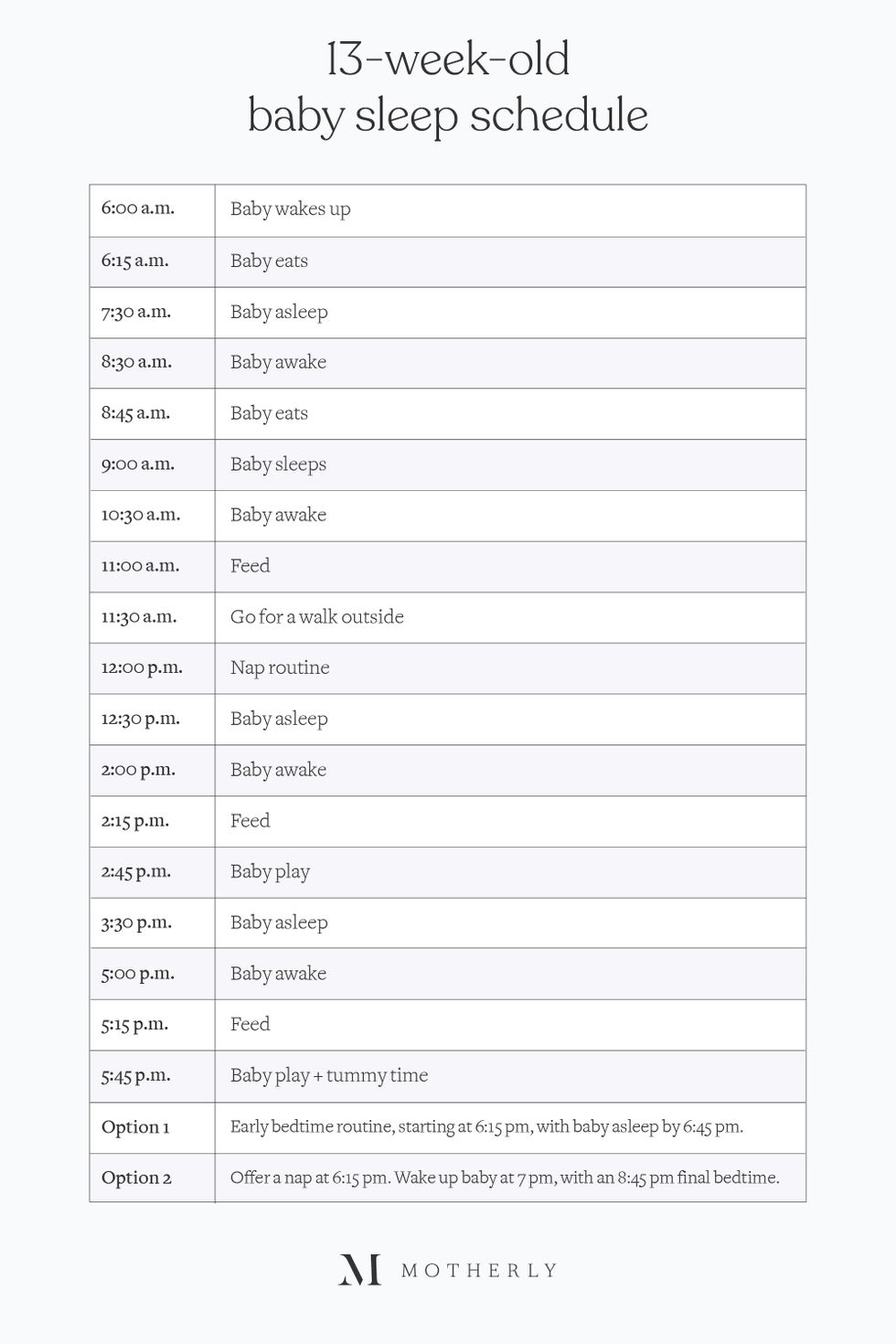
OPTION 1: Early bedtime routine, starting at 6:15 pm, with baby asleep by 6:45 pm.
OPTION 2: Offer a nap at 6:15 pm. Wake up baby at 7 pm, with an 8:45 pm final bedtime.
What are wake windows and why are they important?
A wake window is the period of time a baby can stay awake in between naps without being overtired. Wake windows for a 13-week-old.
For a 13-week-old infant, wake windows could be as long as an hour or longer. Though they're likely only spending seven to 10 hours awake within a 24-hour period, and they're still too little to stay awake for that many hours in a row (and will be for a very long time)!
During your infant's wake window, you can play with baby toys, sing to them, cuddle, work on tummy time, let them enjoy a baby mat while lying flat on their back, or have some swing time while you putz around the house. Whatever you want to do with your little one is up to you!
Sleep tips for infants
Developing a solid sleep schedule and daily routine is important for your baby and your entire family. By now, your baby likely already has one—they're creatures of habit that way. Remember, flexibility is key for both you and your baby.
Remember, try not to keep your baby awake if they don't want to be. An overly tired infant can have trouble settling down and falling asleep at all, even if they're exhausted. Keeping them awake longer does not mean they'll sleep longer (and this remains true for the duration of childhood).
For more help on sleep schedules and tips for 13-month-old babies click here.
Week 14
At 14 weeks old, your baby is inching toward leaving the newborn stage behind (but don't worry–you can totally keep saying you "just" had a baby all the way until they turn 21—it's a mom rule.)
As your little one continues to grow and develop, one of the most eagerly-anticipated milestones parents can look forward to is more sleep. Babies can be all over the map with their sleep patterns in the newborn weeks , but by 14 weeks old, some patterns may be beginning to emerge. Your baby is getting older, they are eating on a more predictable schedule and they may even be learning how to self-soothe in some instances—and all that translates into hopefully more sleep for all of you.
What will your nights look like with your new 14-week-old baby? We've got the scoop on what's in store for your sleep—including tips and a sleep schedule to help you all get more rest.
How much sleep does a 14-week-old baby need?
Although your little one is growing older, your baby still requires a lot of sleep: a newborn should get 14-17 hours of sleep per 24 hours , according to the National Sleep Foundation.
"By 14 weeks, your baby is nearing what most parents refer to as the ' four-month sleep regression ,'" says Rachel Mitchell, a certified pediatric and maternity sleep consultant . "This can feel scary if you are anticipating your baby's sleep to become worse, but remember what is actually happening is that your baby is progressing. While this progression can affect sleep, it doesn't affect all babies in the same way. For some it is a very subtle shift and for others, it is more noticeable. Some babies also start this progression a bit early, so if you notice that your baby starts to wake up more frequently at night, or suddenly take short naps, it is possible they are moving through this progression. The best thing you can do for your baby is to stay consistent and keep addressing the foundations of sleep. Try not to panic or change too many things at once, as this can cause your baby to take longer to move through this progression and potentially create additional habits along the way."
Fourteen-week-old baby sleep schedule
By 14 weeks old, your baby may have started to put herself on her own sleep schedule—many babies start to develop natural circadian rhythms sometime around three months old. However, not all babies are the same and some may need a little extra encouragement to find the perfect sleep schedule that leaves you all feeling a little more rested.
The right sleep schedule can actually encourage your baby to sleep more, and get better quality sleep. Every baby is different and it's important to follow your baby's sleep cues whenever possible, but to help guide you along the way, here's what a sample sleep schedule for a 14-week-old baby might look like. (Keep in mind that this is just a sample and your own schedule might look a little different.)
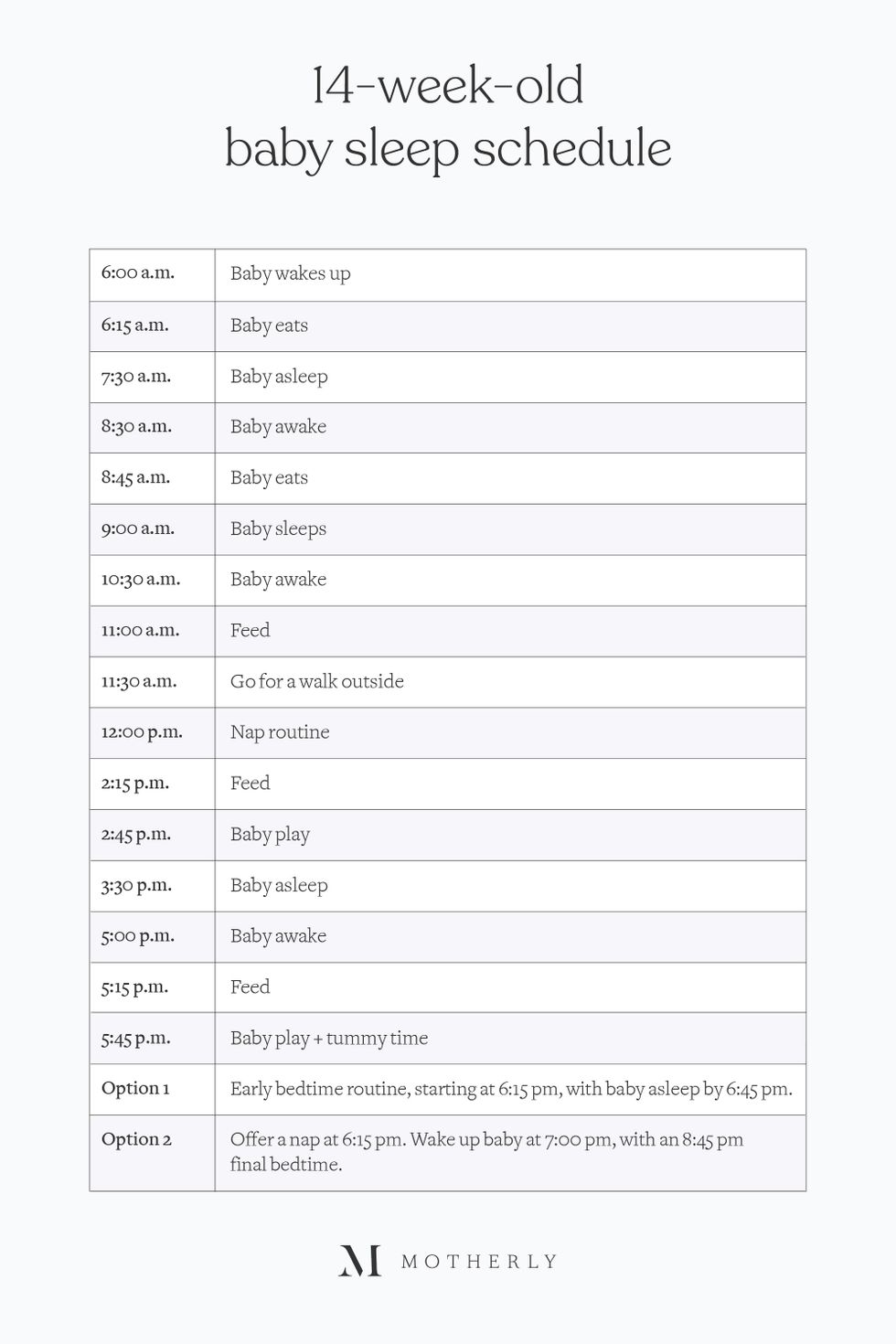
Wake windows for a 14-week-old
By 14 weeks old, your baby's wake window will start to gradually increase to around two to four hours between naps. However, it is important to keep in mind that even if your baby can stay awake for longer periods of time, it doesn't always mean they should.
At this age, babies still can't always regulate their own sleep patterns and may simply stay awake instead of falling asleep when they're tired. That's why understanding your baby's sleep cues and sticking to a pretty regular sleep schedule (although sometimes, life happens, we know!) can be helpful.
Sleep tips for newborns:
Fourteen weeks can be a somewhat difficult stage as far as sleep goes, because some babies will still be hanging around the newborn sleep phase where anything goes, while others will be tiptoeing into more "normal" sleep and wake patterns.
The most important thing to remember at this age is that every baby develops differently, so don't get discouraged if your friend's three-month-old is snoozing soundly through the night while yours is still waking up every hour to eat. Try to learn your baby's cues to recognize when they are getting sleepy before they get overtired, stay consistent with sleep routines and focus on getting rest when you can if your baby is still not quite there yet. (But they'll get there–we promise!)
Week 15
As the early weeks go by, your newborn's sleep schedule can sometimes be tricky to figure out: how much sleep does your baby actually need anyway? And are they getting enough sleep? If you're wondering about how much sleep your 15-week-old baby should be getting each day, you've come to the right place. Because sleep is so vitally important for both you and your baby, we've created a helpful week-by-week guide to assist you in navigating the early months of your baby's sleep journey . You've got this, mama.
To help you navigate these early weeks of newborn sleep, we've put together a handy sleep schedule of how much your 15-week-old is sleeping, plus some tips on these early days of sleeping.
How much sleep does a 15-week-old baby need?
Your new baby needs lots of sleep: according to the American Academy of Sleep Medicine, a newborn should get 12-16 hours of sleep per 24 hours . And according to the Baby Sleep Site , at just shy of four months old, your baby will fit well within that timeframe, as they should be getting 11-12 hours of sleep at night and 3-4 hours during the day.
"At 15 weeks your baby is nearly 4 months, which is a huge milestone for your baby. Your baby's melatonin is starting to ramp up, their circadian rhythm is kicking in, and they are starting to develop more predictable patterns. In this stage, I recommend parents try to follow a 12-hour cycle, so 6-6, 7-7, or 8-8. For example, if your baby is waking for the day at 7 am, their ideal bedtime would be 7 pm," says Rachel Mitchell, founder of My Sweet Sleeper .
During weeks 14-16, the Baby Sleep Site suggests beginning to develop a consistent sleep routine, reviewing your baby's schedule, consider gentle sleep coaching/training (if necessary), create a sleep plan for your family, gather support from your village (so important!) and prepare for sleep regression , which can occur around four months of age.
I know this sounds like a lot (after all, babies need to eat, poop and play, too!), so we've put together a sample sleep schedule of what one 24-hour period with a 15-week-old baby would look like. (Note: this is meant to be a rough guide of what you can expect your baby to do; however, this is not meant to be a sleep schedule to attempt to put your baby on.)
15-week-old baby sleep schedule
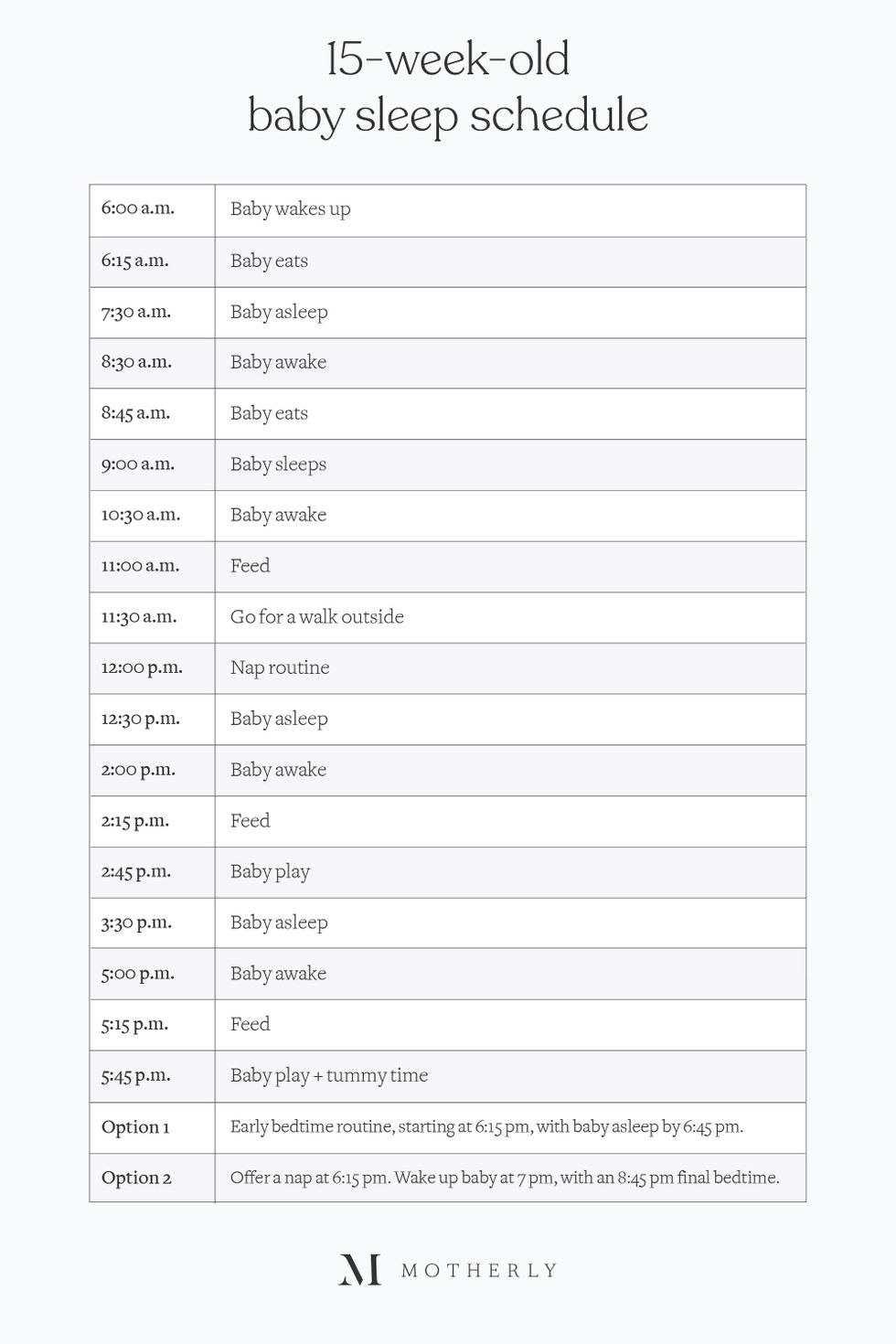
OPTION 1: Early bedtime routine, starting at 6:15 pm, with baby asleep by 6:45 pm.
OPTION 2: Offer a nap at 6:15 pm. Wake up baby at 7 pm, with an 8:45 pm final bedtime.
"While awake windows still take priority over a sleep schedule, you can aim for this as your goal each day, just don't worry if it doesn't end up following this pattern perfectly. Continue to work on moving up bedtime and gradually introducing more independent soothing skills," says Mitchell.
Wake windows for a fifteen-week-old
A wake window is the period of time a baby can stay awake in between naps without becoming overtired (because newborn babies are unable to self-regulate their own sleep patterns, they can become overtired instead of simply just falling asleep).
The average wake window for a 15-week-old newborn is about 2 hours, according to Amy Motroni, a baby and toddler sleep consultant. While baby is awake, it's time to for eating, playing and getting a diaper change. As your baby approaches 4 months old, they will likely be staying awake more during the day, while some naps may be getting shorter.
Somebody get a cake, because it's your baby's sweet sixteen! No, they aren't asking for your keys to hit the road (yet), but your baby is turning sixteen weeks old, which, in the infant world, is kind of a big deal.
Sixteen weeks is when your baby officially moves from "newborn" to "infant," which means that the unpredictable newborn sleep schedule of mixed-up nights and days should be coming to an end. Of course, all babies are different and parenting always comes with some sort of sleep deprivation (flash forward once again to those teen driving years, yikes!), but there is hope on the horizon when it comes to catching some zzzzz's again.
The four-month mark brings a lot of exciting developments and changes, especially in the sleep department. Read on for what a sleep schedule with your new 4-month-old might look like, along with some sleep tips to get you there.
How much sleep does a 16-week-old baby need?
At 16 weeks old, your baby still requires lots of sleep, but not as much as a newborn: a baby this age should get 12-15 hours of sleep per 24 hours , according to the National Sleep Foundation.
"Yay, your baby is now 4 months old! At this point their sleep needs are slightly less, with the recommendation between 3.5-5 hours of day sleep and between 10-12 hours of night sleep," says Rachel Mitchell, a certified pediatric and maternity sleep consultant. "At four months, your baby's sleep starts to change quite a bit. Melatonin really starts to produce, their circadian rhythm is driving sleep patterns, and their bedtime should be on the earlier side (ideally between 7-830 pm.). This is a lot for your baby to go through at once, so consistency in this stage is key."
Mitchell says naps should also follow a pattern: "Your baby is hopefully following a consistent pattern of 3-4 naps per day, with two of those naps at least 1-2 hours. If your baby is napping more than 2.5 hours in this stage, you want to wake them up . If the last nap of the day starts to blend with bedtime, then wake your baby up sooner to give them adequate awake time before bed (at least 2 hours)."
16-week-old baby sleep schedule
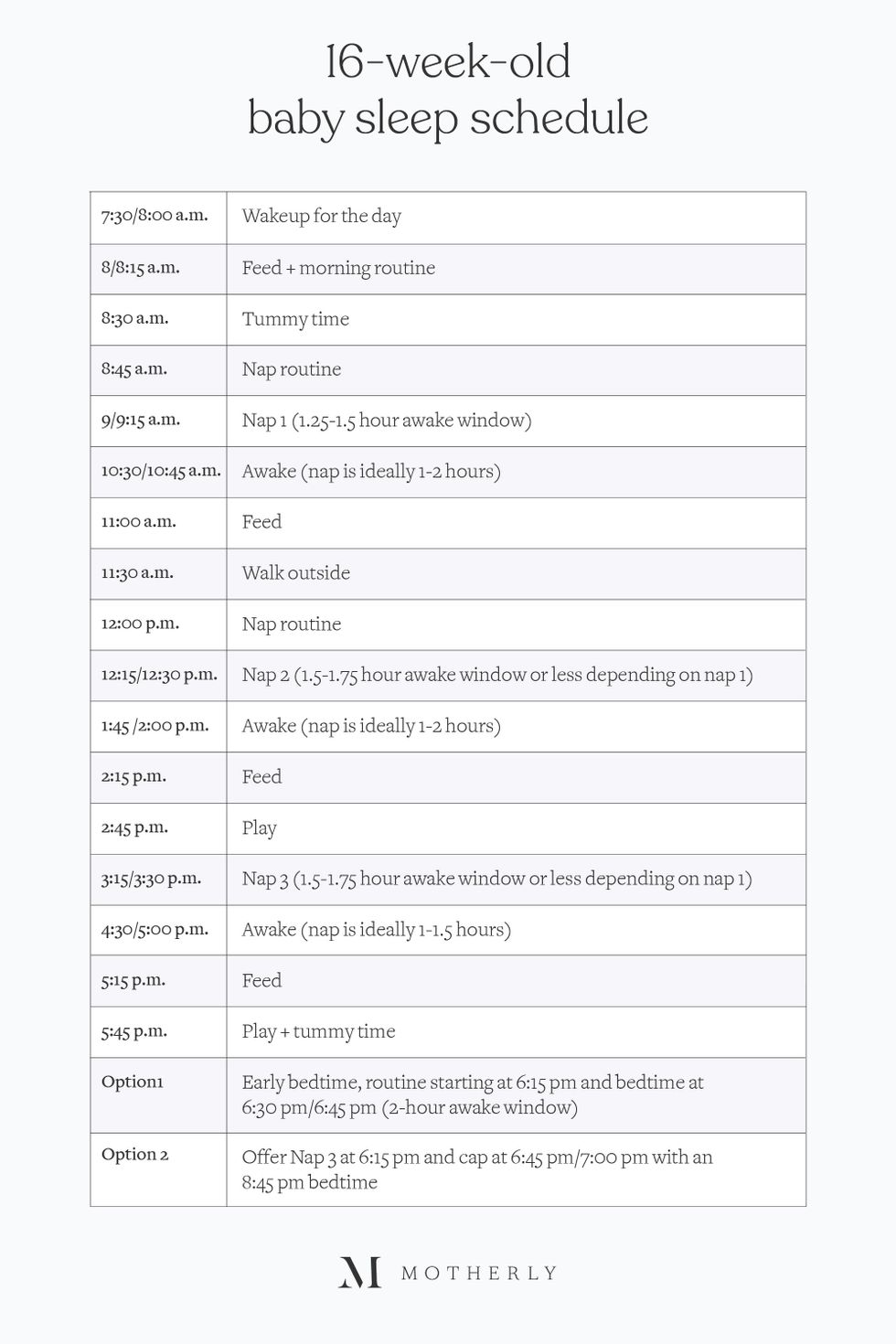
With baby graduating past the newborn stage, that's not to say that every baby will magically start sleeping through the night at 16 weeks old or that all babies will follow the same pace of development. That just means that, ready or not, your baby is already starting to grow up and that means adjusting to some new sleep patterns along the way. Here's what a sample sleep schedule for a sixteen-week-old might look like.
Sleep tips for newborns:
Although your baby may be on a more regular sleep schedule–or at least moving in that direction–by sixteen weeks, there will still be plenty of things that could interfere with her sleep in the coming months.
From teething to minor illnesses to growth spurts, you can expect that your baby's sleep will be interrupted from time to time, and that's okay. As long as you stick to a pretty regular sleep schedule and work to establish sleep cues and self-soothing techniques as appropriate for your baby's development, you can hopefully create positive sleep habits that will benefit both you and your baby.
4 months old

A 4-month-old baby should sleep 14 to 15 hours total each day: 11 to 12 hours at night and three to four hours during the day spread out over four or five short naps.
The 4-month mark is a big milestone, however, because it marks the first (and usually the most disruptive and challenging) sleep regression of your baby's life.
At 4 months of age, your baby undergoes some major brain developments that impact her sleeping patterns. She becomes more aware of the world around her. And simply put, at 4 months, your baby starts sleeping less like a baby and more like an adult.
This usually means that a baby who may have been sleeping fairly well is suddenly waking up every 20 minutes during the day, and almost as frequently at night.
There is really no "fix" for this 4-month sleep regression ; these changes to your baby's sleeping patterns are permanent.
But don't despair. You CAN reclaim your nights by simply teaching your baby how to fall asleep without the use of any sleep associations, like rocking or feeding to sleep. That process is called sleep coaching .
Four months is generally the earliest you should work on sleep coaching, and it's best to use gentle, gradual methods at this young age. By no means do you have to try sleep coaching—it's not for everyone. But if sleep is a real problem in your home, then sleep coaching can be a nice option.
Sleep coaching includes methods like putting baby to bed drowsy but not asleep, picking up your baby for a bit when she cries and then putting her back down, sitting in a chair to provide a reassuring presence, or even allowing baby limited time to cry-it-out. There is no one size fits all method for babies and families, you need to contemplate and test what works best for you. (For more details about how to implement each of these methods, see a brief overview here .)
Some babies are able to sleep eight straight hours or more at night by 4 months, but the large majority aren't; one to three night feedings are still considered very normal at this age.
Your baby may be ready for a more by-the-clock schedule at this age, but many aren't, so be flexible.
You can see a sample 4-month-old sleep and feeding schedule here.
5 months old
At 5 months old, your baby will be sleeping about 14 total hours each day: 11-12 hours at night, and 2-4 hours during the day, spread out over about 4 naps. The last nap of the day is likely more of a short catnap, which is normal at this age. Night feedings are still very normal at this age, too; many babies will still need 1-2 feedings at night.
By the time your baby is 5 months old, the worst of the 4 month sleep regression has likely passed, and you can really start to work on sleep coaching, if you haven't already.
This is usually a great window of time during which to sleep coach: your baby isn't as mobile as he or she will be in another few months and is still young enough that sleep associations haven't yet become deeply-rooted habits. But remember, only sleep coach if you want to—sleep coaching is by no means a mandatory thing! If you're happy with your child's sleeping patterns, and if they work for your family right now, then feel empowered to keep doing what you're doing.
One issue that typically crops up around the 5-month mark is teething. If your baby is suddenly fussy and seems in pain, and if he or she is waking too early from naps or waking more than usual at night, check for bumps and redness on the gums. Teething pain is usually short-lived, but if it's becoming very disruptive, talk to a health care provider about how to alleviate the discomfort.
You can see a sample 5 month old sleep and feeding schedule here.
6 months old

By the time your baby is 6 months old, sleep will most likely have consolidated into 3-4 distinct naps, with each nap being about 1 hour long and any third or fourth nap being about 30 minutes long. By this age, the majority of your baby's sleep should be happening at night (11-12 hours).
If your child is still struggling with short naps at this age, it's likely you need to work on teaching your baby how to fall asleep independently , without any sleep associations like rocking or feeding. Short naps at this age usually happen when a baby wakes briefly between sleep cycles during the nap (something that is very normal and developmentally-appropriate) but then is unable to fall back to sleep without your help. If you notice your baby always wakes 20-30 minutes after falling asleep at nap time, this is likely the problem. Correcting this short nap issue can go a long way towards helping your baby naturally adopt a predictable, clock-based schedule.
As for nighttime waking, keep in mind that while some babies are sleeping through the night by 6 months, others aren't, and that's okay. Formula-fed babies are usually sleeping 8 hours or more at night by this point, but breastfed babies may continue to need 1-2 nighttime feedings .
7 months old
At the 7-month mark, you can expect your baby to sleep about 11-12 hours at night and 2-3 hours during the day, spread out over 3 naps.
These naps are likely becoming fairly predictable at this point, which means you can coordinate feedings around nap times. This is especially important because, by this stage, you have probably introduced solid food meals into your baby's diet. For tips on how to coordinate feedings and naps, you can check out this sample 7 month old sleep and feeding schedule.
By 7 months of age, most babies are able to sleep 8 hours or more at night without feedings; however, your breastfed baby may still need 1 nighttime feeding, and this is perfectly fine. If your baby is still waking multiple times at night, however, it's likely you have a sleep issue on your hands. If that nighttime waking is becoming problematic for your family, you may want to work on sleep coaching, if you haven't already.
Remember, it's very normal for your child to wake between sleep cycles at night (even we adults do this), but if your baby is used to you putting him or her to sleep, via rocking or feeding or holding, then your child won't be able to fall back to sleep without your help. That is the root cause of excessive nighttime waking, and that's why some parents find it necessary to teach their babies how to fall asleep unassisted .
8 months old
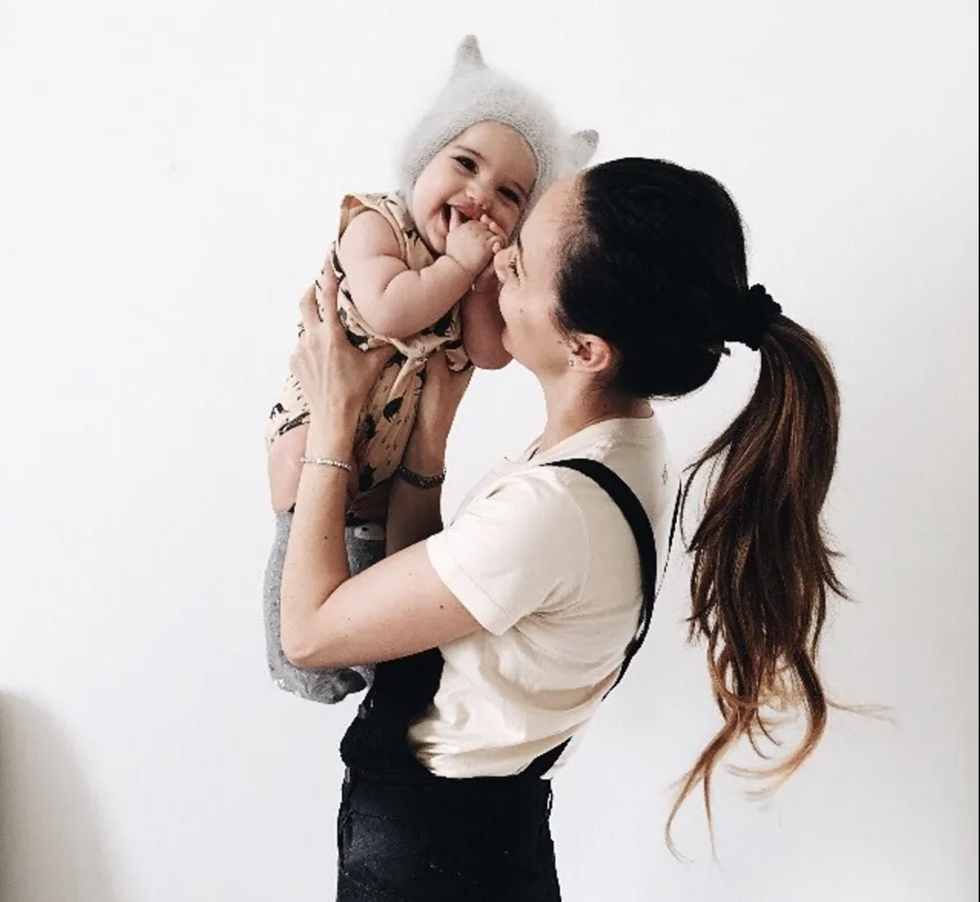
You can expect your 8 month old to sleep about 14 total hours each day: 11-12 hours at night and 3 hours during the day, spread out over 2-3 naps.
Get ready, mama—another sleep regression is on its way! You may still be feeling scarred from the 4 month regression, but don't worry: while the 8-10 month sleep regression is tough, it's not permanent. Within a few weeks, all should be back to normal.
So what is the 8-10 month regression? Well, at some point between 8 months and 10 months of age, your baby will go through a significant developmental leap—his or her mobility will just explode! But while this newfound mobility is exciting, developmental leaps like this wreak havoc on sleep. You'll likely find that your baby suddenly reverts to taking short naps and to waking more than usual at night. Separation anxiety is also a part of this sleep regression; your baby may suddenly seem super clingy and wail loudly every time you leave the room, making naps and bedtime a nightmare.
Fortunately, the worst of this regression should be over in a few weeks. While the regression is happening, do your best to offer plenty of comfort to your baby without creating any new sleep habits you'll have to undo later.
If your 8 month old takes two naps, each should be at least an hour long; if your baby still needs a third nap, it will no doubt be a short (30 minutes or so) catnap in the later afternoon. You can see a sample 8 month old sleep and feeding schedule here.
9 months old
Your 9 month-old baby needs 13-14 total hours of sleep, with 11-12 hours happening at night and 2-3 hours happening during the day over 2 naps. Both of these naps should be at least an hour long.
At this point, if your baby is not yet sleeping through the night , you may be feeling like you're seriously going to lose your mind. 9 months is a long time to endure fragmented sleep, and even getting up just once to feed your baby at night can feel like an excruciating task by the 9-month mark!
Here's something to keep in mind: One night feeding is still normal for breastfed babies at 9 months old. In fact, a small percentage of breastfed babies need to feed once per night until they're about 12 months old. However, if your baby is still waking to feed at night, an attempt at night weaning around 9 months of age is usually a good idea. Why? Simple: by this age, some babies continue to wake and feed out of habit, and not necessarily because they need the nourishment. It's true that some babies will naturally night wean without any nudges from mom, but others won't. If your baby is still feeding at night, it may mean you need to offer a little night weaning help.
Signs your 9 month old may be ready to night wean include: Your baby isn't eating as much during the day. Your baby isn't really eating during night feedings and is treating them more as playtime or comfort time. Your baby has started solid foods and is getting plenty of daytime nourishment.
These signs together are a strong indication that you can work on night weaning your baby and encouraging sleeping through the night.
10 months old

At 10 months old, your baby will sleep 13-14 total hours, most likely. You can expect 10-12 hours of sleep at night, and 2-2.5 hours during the day, spread out over 2 naps.
Good news: if you haven't yet worked on sleep coaching your baby, and if short naps and nighttime waking are still a problem, this is another ideal time to work on healthy sleep habits.
By now, the 8-10 month regression is likely over (thankfully!). And while you may have felt reluctant to work on sleeping habits earlier, when your baby was young, by this point, you can trust that your baby is more than ready, developmentally, to sleep through the night (possibly with 1 feeding) and take long, restorative naps. Again, by no means do you have to sleep coach; if your child's night waking and shortened naps aren't really a problem for you, or for your baby, then no worries—keep doing what you're doing! But if sleep deprivation is taking a toll on your family's health and happiness, then sleep coaching can help resolve that issue. You can see a sample 10 month sleep and feeding schedule here.
11 months old
At 11 months old, your baby will sleep about 13-14 hours each day. You can expect 10-12 hours of sleep at night, and 2-2.5 hours during the day, spread out over 2 naps.
You may find that your baby's appetite for solid foods is increasing these days; this is normal (most likely because your child is moving around a whole lot more these days!).
You can compensate for this increase in appetite by offering several healthy snacks throughout the day. Timing up these snacks around your child's usual mealtimes can really help ensure that naps stay nice and long, and that your baby doesn't wake up hungry in the middle of the night.
Learn more by checking out this sample 11 month old sleep and feeding schedule here.
1 year old
Your 12 month old will sleep about 13-14 total hours each day. You'll most likely get 10-12 hours of sleep at night, and 2-2.5 hours during the day, in 2 naps.
Welcome to toddlerhood, parents! That's right—your adorable baby is now officially a toddler. Fortunately for you, this doesn't have much of an impact on sleep at this point; although at the 12-month mark, we do tend to see a little mini-nap regression. This toddler sleep regression is nowhere near as disruptive as the 4 month sleep regression, or the 8-10 month sleep regression, but it does have an impact. The 12 month nap regression happens when your toddler suddenly seems ready to give up the afternoon nap, and transition to just one nap during the day. Many parents notice that for several weeks, their 12 month old babies refuse one of their naps altogether. However, bear in mind that 12 months is a bit too early for most babies to transition to one nap; it's usually better to wait out this regression and stick to offering two naps until your baby is about 15-18 months old. At that point, you can transition to offering just one afternoon nap. If you wait out this little "nap strike," you will probably find that in a week or so, your 12 month old goes back to taking two naps without a fuss.
Emily DeJeu is a writer with The Baby Sleep Site, a leading resource helping mamas—and their babies—get their rest.
This post was originally published in 2015; it has been updated.
infant sleep schedules, newborn won't sleep, baby sleep help, baby won't sleep, wxw 102, week102, Mama, baby sleep, Sleep, Fourth Trimester, brandedsynacor2020
17*2.5 Should Baby Eat More if Sleeping Through Night
Source: https://www.mother.ly/parenting/sleep-like-a-baby-your-expert-guide-to-12-months-of-rest/
0 Response to "17*2.5 Should Baby Eat More if Sleeping Through Night"
Post a Comment